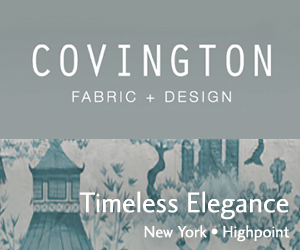American Decorative Adds Two Distribution Points, New Salesman
April 17, 2000
New York - Last year was a banner year for American Decorative Fabrics, and Joe Rosenfeld, president of American Decorative Fabrics, expects another. Rosenfeld said that the company has expanded its loom capacity to eight times what it was in the middle of 1997, and that it continues expanding production at that pace.
This year, the company has added distribution facilities in Chicago and Los Angeles. Rosenfeld said that ADF's warehouse facilities in High Point, N.C., (where the company keeps a stock of its complete inventory) and Tupelo, Miss., are struggling to keep up with demand. ADF has also hired a salesman, Andy Grossman, whose exclusive domain will be the domestic market.
''At this stage, business is growing by two- or three-fold,'' Rosenfeld said. ''We have made major investments in wide looms, giving us much larger capacity to weave most of our constructions up to 126-inch widths.''
Rosenfeld said that one of the keys to the mill's success has been its steady price points. Despite a dramatic increase - up to 40 percent - in the price of synthetic fibers in the past year, Rosenfeld said that ADF has managed to maintain its price points since December 1998.
As a result, the placements of ADF fabrics with furniture manufacturers has grown substantially, and the growth in the bedding industry has been ''phenomenal,'' he said. In addition, a number of national retail chains have begun specifying ADF products to their suppliers.
Growth of worldwide sales, particularly in Latin America and China, has kept pace with the growth in the U.S. market. Rosenfeld said that as a privately owned, vertical operation, ADF has advantages over the competition in China.
''Most Chinese mills are still government-owned and must sell through trading companies, making it very difficult for customers to communicate directly with the mill,'' he said. ''With ADF, all communications are directly with the mill owners, management, and designers.''
Rosenfeld said that the concepts of timely delivery, price stability, quality control and styling of products for the international markets remain concepts still foreign to most mills in China. In response to the styling needs of the international marketplace, ADF has been expanding its studio facilities and has added additional computer design stations in Shanghai. Rosenfeld said that the success of ADF's export business depends largely on the company's ability to customize artwork and colorways for specific countries and for specific customers.
Rosenfeld said that initially ADF was known primarily for its low-priced, over-constructed tapestries. But subsequent collections have expanded to include a growing range of tapestries as well as new products such as cotton linen jacquards, yarn-dyed emberlin stripes, a collection of coordinating yarn-dyed patterns with striated ground, yarn-dyed washed jacquards in an assortment of colors, natural washed jacquards and heat-transfer prints on dyed grounds and an assortment of other products as well. Rosenfeld said that the company's prices are generally $2 to $3 per yard below competitors' prices.
F&FI
This year, the company has added distribution facilities in Chicago and Los Angeles. Rosenfeld said that ADF's warehouse facilities in High Point, N.C., (where the company keeps a stock of its complete inventory) and Tupelo, Miss., are struggling to keep up with demand. ADF has also hired a salesman, Andy Grossman, whose exclusive domain will be the domestic market.
''At this stage, business is growing by two- or three-fold,'' Rosenfeld said. ''We have made major investments in wide looms, giving us much larger capacity to weave most of our constructions up to 126-inch widths.''
Rosenfeld said that one of the keys to the mill's success has been its steady price points. Despite a dramatic increase - up to 40 percent - in the price of synthetic fibers in the past year, Rosenfeld said that ADF has managed to maintain its price points since December 1998.
As a result, the placements of ADF fabrics with furniture manufacturers has grown substantially, and the growth in the bedding industry has been ''phenomenal,'' he said. In addition, a number of national retail chains have begun specifying ADF products to their suppliers.
Growth of worldwide sales, particularly in Latin America and China, has kept pace with the growth in the U.S. market. Rosenfeld said that as a privately owned, vertical operation, ADF has advantages over the competition in China.
''Most Chinese mills are still government-owned and must sell through trading companies, making it very difficult for customers to communicate directly with the mill,'' he said. ''With ADF, all communications are directly with the mill owners, management, and designers.''
Rosenfeld said that the concepts of timely delivery, price stability, quality control and styling of products for the international markets remain concepts still foreign to most mills in China. In response to the styling needs of the international marketplace, ADF has been expanding its studio facilities and has added additional computer design stations in Shanghai. Rosenfeld said that the success of ADF's export business depends largely on the company's ability to customize artwork and colorways for specific countries and for specific customers.
Rosenfeld said that initially ADF was known primarily for its low-priced, over-constructed tapestries. But subsequent collections have expanded to include a growing range of tapestries as well as new products such as cotton linen jacquards, yarn-dyed emberlin stripes, a collection of coordinating yarn-dyed patterns with striated ground, yarn-dyed washed jacquards in an assortment of colors, natural washed jacquards and heat-transfer prints on dyed grounds and an assortment of other products as well. Rosenfeld said that the company's prices are generally $2 to $3 per yard below competitors' prices.
F&FI
















